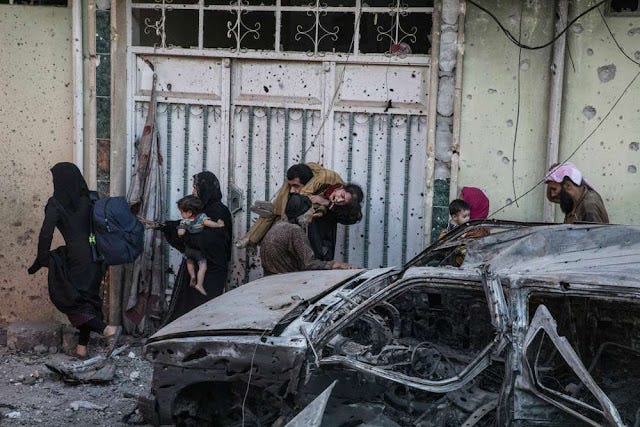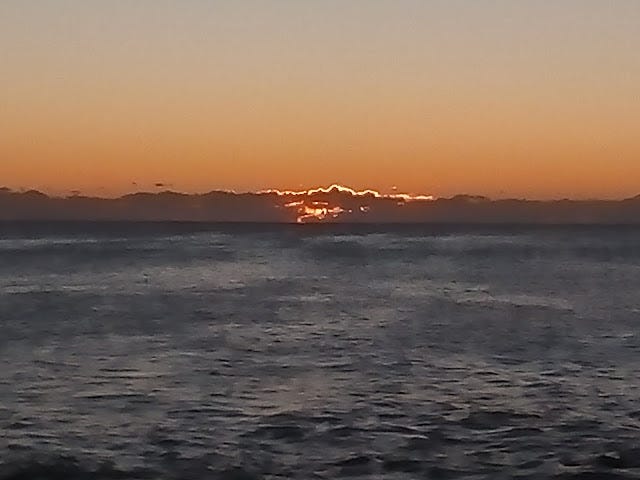
East Coast, Australia, dawn.
The perimeter had been established. whirring sound, a weapon, sheaves of weapons, they did not know, throbbed in a space between the real and the unreal. Old Alex kept up the mundane issues, repeating time and again: "Surveillance is harassment. I have been very very badly harassed."
They only acted when the gods were roiled.
The gods were roiled.
Mosul was falling.
The mujaheddin lay dead in their hundreds, thousands.
More than 800,000 people had fled.
Every last one of them would despise the Americans for the rest of time.
Already, the bodies were beginning to rot amongst the chaos of the bombing.
Once again, the West would claim victory over a ruin.
He had written the previous year, in similar circumstances, cold, restless, frustrated, lonely at heart, driven to distraction by the surveillance:
There were many divines about in that strange, compelling,
confounding time.
The truth is, the people abide my kind, but no one loves us. There
is awe, but no affection. We grow used to the turned shoulder, the
retreating back, the bright conversation that sputters to a murmur
when we enter a room, the sigh of relief when we leave it. I have
never become used to it: the awe the common men have for my
kind. I suppose it is because I feel no more than a common man
myself. Even less, perhaps. No more than a tool in the hand of an
unseen craftsman, something to be used as needed and then cast
casually aside. They do not understand that I am given only to see
those matters that roil the heavens.19
It was only on rare occasions he met a kindred spirit.
"You have on old soul," an acquaintance had said to him in Bangkok
several years before. "You meet them sometimes..."
Much, as always, was left unsaid.
The big boys were in town, with their military mindsets and orders from on high. Once again they spoke of heart attacks, an old CIA trick, for they could simulate a heart attack and leave no trace.
Never doubt: they want to kill you.
Democracy was nothing of the kind.
Freedom of expression had been lost long ago.
Others were for caution. We learn more than we lose. But that's what they did, killed people, blew things up. It was their solution to everything. For decades, destroying the remnant images of democracy as a force for good, they had terrorised people across the globe, attempting to expand power so ineptly that in the end they destroyed it.
In the whispering trees that were the outside, a woman finally rested. She had been fretting for months about her husband's cancer, her emotional distress far greater than his physical pain.
They were sweeping now, those weapons from another place, curling up, a clutter of flying knifes, sheaves, forming into swarms as they flew upwards. Trans-dimensional. The perimeter impregnable.
The gods were roiled. And there would be no peace.
THE BIGGER STORY:
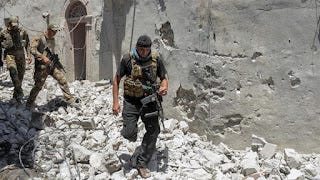
http://www.aljazeera.com/news/2017/06/iraq-isil-suicide-bombers-blocked-mosul-170626082142053.html
Fighters of the Islamic State of Iraq and the Levant (ISIL) launched a string of counterattacks in western Mosul, setting off clashes that continued overnight, Iraqi officials said on Monday.
An unknown number of suicide bombers and gunmen targeted the Hay al-Tanak and Yarmuk neighbourhoods, and set fire to houses and cars in Tanak, military officials told news agencies.
The area had been declared free of ISIL in May.
Several people are reported to have died in the attacks, which sowed panic among residents who had returned to the area, and prompted hundreds of families to flee overnight.
Staff Lieutenant General Abdulwahab al-Saadi, a top commander in the Counter-Terrorism Service (CTS), which sent forces to fight the ISIL gunmen, said the attackers had infiltrated the area by blending in with returning displaced civilians.
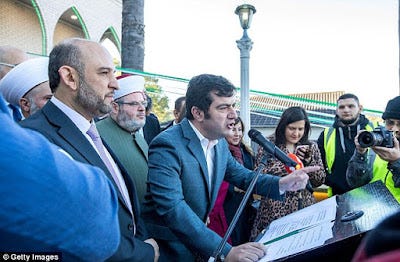
http://www.dailymail.co.uk/news/article-4638610/Labor-senator-says-Islam-gathering-Aussie-gets.html#ixzz4l721YiXs
A Labor senator who fled Iran as a boy has described the end of the holy Muslim month of Ramadan as something that is 'as Aussie as it gets'.
Sam Dastyari made the comments on the steps of Lakemba Mosque in western Sydney's Islamic heartland to commemorate the Eid festival in front of hundreds of Muslims.
'Eid Mubarak. How Aussie is this?' he said to cheers in the presence of New South Wales Liberal Premier Gladys Berejiklian.
'The steps of Lakemba Mosque on a Sunday morning. As Aussie as it gets.
'Celebrating Eid amongst politicians from both Labor and Liberal.'
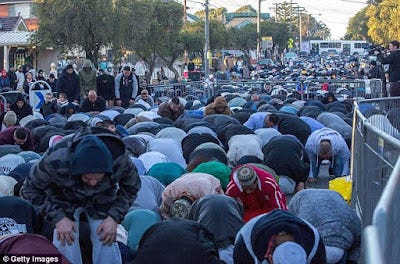
Mr Yemini, a former Israeli soldier, said it was disturbing for any politician to describe the end of Ramadan as something quintessentially Australian.
'Lakemba mosque is probably as far from as Aussie as it gets,' he said.
'This is the same Lakemba Mosque, in 2012 I believe, which issued a fatwa against Christmas.
'As Aussie as it gets, eh, mate?'
However Senator Dastyari, who was born in Iran and moved to Australia as a boy in 1988, said he was a proud supporter of multiculturalism.
'What I want to say is this: there are those out there, and we know who they are, that try and denigrate multicultural Australia, that try and denigrate our communities and I just want to say one thing today: 'Our love and our unity will always defeat their hate and their division,' he said.
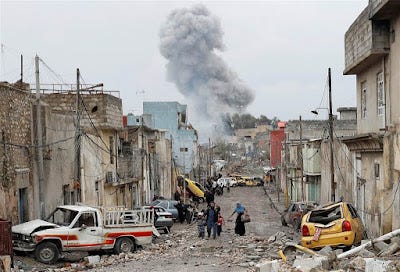
https://www.theguardian.com/world/2017/jun/24/kurds-see-historic-chance-advance-cause-ruins-islamic-state?CMP=share_btn_fb
As what remains of Islamic State crumbles, the would-be victors have started circling. In Mosul, Iraqi forces have begun preparing for peace in the city where the now-encircled marauders took root three years ago. Across the border in Raqqa, with five of its neighbourhoods under their control, Kurdish forces are contemplating what comes next for them and their cause.
Analysis Ever-closer ties between US and Kurds stoke Turkish border tensions
Following Turkish airstrikes last week, US armoured vehicles have been deployed as a buffer between Kurdish and Turkish forces
Day-after scenarios are rapidly being plotted by every group that has played a role in Iraq and Syria over many years of war and loss. Russia, the US and Iran are jostling for advantage across the swath of both countries held by the capitulating group. The prize is far more than who gets to claim the inevitable military victory over Isis. At stake, for all sides, is the future make-up of the region and a chance to shape it in their likeness.
The wish list of outcomes is broad and divergent. For Russia, there is the chance to establish a presence in the centre of the region, with political muscle and enhanced gas and oil interests. For Iran, a consolidated and potentially decisive role in both countries. And for the US – in the absence of a broader strategy – the chance to spoil its rivals’ plans.
Amid the great power struggles, others too have sensed opportunity in chaos. The Kurds of Iraq and Syria have made little attempt to hide the fact that the post-Isis vacuum marks a rare, potentially historic, moment.
In Iraq, the president of the largely autonomous Kurdish north, Massoud Barzani, has called a referendum on independence to be held on 25 September. In Syria, Kurdish forces raised by the US, and sent to oust Isis from one of its last two citadels, believe that their role can be parlayed into broader autonomy.
Across a dizzying battlefield that has devolved into a series of concurrent conflicts within the one war, Kurdish forces backed by the US are making steady gains in Raqqa. In Iraq, in the early phases of the fight for Mosul, the peshmerga played an important part in securing the city’s northern and eastern approaches.
The role they played in Iraq and continue to play in Syria is seen by both Kurdish factions as offering significant leverage in any negotiations. The view elsewhere is very different. Iraq and Turkey have said they would not support a break-up of Iraq, symbolic or otherwise, and have shown little enthusiasm for more than the current arrangements, which allow – begrudgingly in Baghdad’s case – the Kurds to sell oil taken from fields in northern Iraq through a pipeline they have built to Turkey.
The US has refused to support talk of Kurdish independence since the invasion to oust Saddam Hussein, wedding itself to the position that a united Iraq best serves its disparate peoples. Overriding the view are the explicit fears of regional allies that a break-up of Iraq along ethnic lines would directly threaten their own borders.
“That position won’t change,” said a senior US official. “It is not the time to be redrawing state boundaries, especially in Iraq and Syria. Such talk can only be advanced by broad regional consensus. And we are nowhere near that yet.”
Turkey, which has forged close economic ties with Iraqi Kurdistan as a means of maintaining the status quo, has been even more vehemently opposed to US backing for Kurdish groups in Syria, pointing to their ties to the Kurdistan Workers’ party, or PKK, with whom Ankara has fought a deadly four-decade insurgency inside its borders.
In the Iraqi Kurdistan capital of Erbil, the security chancellor of the region, Masrour Barzani, says Turkey has nothing to fear from the poll. “The referendum will shape the bilateral relationship between Kurdistan and the rest of Iraq,” he said. “We do not intend to change borders of neighbouring states. It simply formalises a delineated border between Kurdistan and the rest of Iraq.
QUOTE:
Anthem
The birds they sang
At the break of day
Start again
I heard them say
Don't dwell on what
Has passed away
Or what is yet to be
Yeah the wars they will
Be fought again
The holy dove
She will be caught again
Bought and sold
And bought again
The dove is never free
Ring the bells (ring the bells) that still can ring
Forget your perfect offering
There is a crack in everything (there is a crack in everything)
That's how the light gets in
We asked for signs
The signs were sent
The birth betrayed
The marriage spent
Yeah the widowhood
Of every government
Signs for all to see
I can't run no more
With that lawless crowd
While the killers in high places
Say their prayers out loud
But they've summoned, they've summoned up
A thundercloud
And they're going to hear from me
Ring the…
